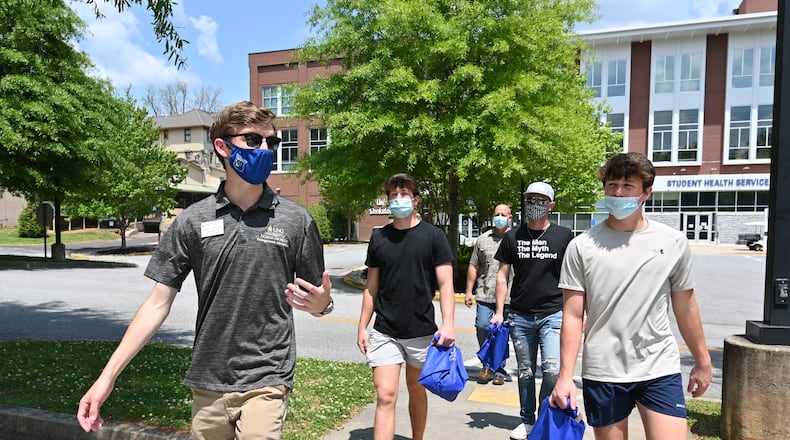The news isn’t bad, but it’s not good either.
Georgia’s rate of decline in coronavirus cases has slowed over the last month or so, and the number of new infections is holding steady.
The seven-day rolling average of new confirmed and suspected infections is about 1,400, according to state Department of Public Health data. That rate has been essentially flat since mid-March. It’s a sharp decline from the post-holiday surge in January, when the daily rolling average surpassed 9,600 cases.
Georgia ranked in the middle of the nation in the rate of new cases per 100,000 people for the seven days that ended Tuesday, according to federal data. Georgia’s seven-day death rate, though down considerably from the peak, remains stubbornly high compared to the rest of the country
Vaccinations across the state surged in March as Georgia loosened eligibility requirements, ultimately allowing anyone 16 and older to get shots.
But demand has been waning, and the pace has slowed to the point that the state announced plans to close its eight mass vaccination sites before Memorial Day.
In the meantime, the Atlanta Braves and Atlanta United announced plans to soon expand to maximum fan capacity at Truist Park and Mercedes-Benz Stadium.
Here’s a look at major COVID-19 developments over the past week.
State sites to shut down
Georgia operates mass vaccination sites in Clarkesville, Columbus, Emerson, Hapeville, Macon, Sandersville, Savannah and Waycross. About 300,000 vaccine doses have been administered at sites since they opened. A temporary facility in Albany already has closed.
State officials said demand has waned at the eight facilities, while supplies at private providers and local health departments have grown.
The state-run facilities are shifting to single-dose Johnson & Johnson shots and providing second doses of the Pfizer vaccine to complete vaccinations of as many people as possible before their expected closure on May 21.
A mass vaccination site at Mercedes-Benz Stadium, run by Fulton County and the federal government, is scheduled to operate through May 19.
Georgia’s vaccination rate remains near the bottom nationally. A recent drop in daily vaccinations — both in Georgia and nationally — could signal the need for a new approach in order for the state to get to herd immunity. Experts said public health officials need to make it more convenient to get shots, particularly for people whose health care needs are underserved.
Residents can sign up for an appointment or find information about walk-up availability at the eight state-run facilities at www.myvaccinegeorgia.com. For more information about the vaccines, to find private sector providers or to book appointments through local health departments, visit https://dph.georgia.gov/covid-vaccine.
CDC: If fully vaccinated and outside, no mask needed
Americans who have been fully vaccinated don’t need to wear protective masks outdoors any longer, the Centers for Disease Control and Prevention announced.
The CDC is continuing to recommend masks for indoor gatherings or crowded outdoor events. Masks are no longer recommended for such activities as outdoor walking, running, hiking or biking; small outdoor gatherings with fully vaccinated family and friends; small outdoor gatherings with a mixture of fully vaccinated and unvaccinated people; and dining at outdoor restaurants with friends from other households.
Credit: Curtis Compton / Curtis.Compton@
Credit: Curtis Compton / Curtis.Compton@
Pro teams to return to 100% capacity
Both the Atlanta Braves and Atlanta United are expanding their seating capacities to pre-pandemic levels.
The Braves said Truist Park’s capacity will return to 100% — about 41,000 seats — beginning with the Friday game against the Philadelphia Phillies. And Atlanta United said it will return soccer configuration capacity at Mercedes-Benz Stadium to 100% — roughly 42,500 seats — starting with the May 15 match against Montreal.
Both teams cited COVID-19 vaccines as the reason for their decisions to expand attendance limits. About a third of Georgia residents have had at least one dose of the COVID-19 vaccine, and one in four are fully vaccinated, according to the state Department of Public Health.
“We have had great success welcoming our fans back safely to Truist Park,” Braves President and CEO Derek Schiller said in a statement. “Our outdoor environment (and) the demand from our season-ticket holders and fans to watch us play in person, plus safety measures which are in place, make it feel that now is the right time to get back to full capacity at Truist Park.”
Public health experts say that, while outdoor venues provide better protection than indoor arenas, reopening any stadium to full capacity is particularly risky, given the sheer number of people crowded together.
“The best thing for me to say about this announcement is it’s ill-considered, but it seems to be a very dangerous thing to do because we are on a downward trend and now is not the time to let up,” said Dr. Richard Rothenberg, an infectious disease expert at Georgia State University.
Rothenberg said he understands that people, over a year into the pandemic, “are really sick of the disease, and just feel like ‘I am done with this.’” But he worries the return to full capacity will lead to an increase in cases and only delay getting the pandemic under control.
Staff writers J. Scott Trubey, Ariel Hart, Tim Tucker, Doug Roberson, Gabriel Burns and Tim Darnell contributed to this report.
The Latest
Featured





